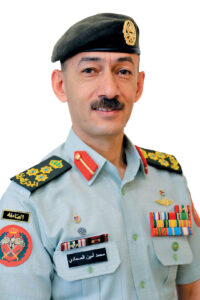
Armies rely on logistical support because it is the artery that feeds military operations. In any operation, these forces tend to be the first troops in and the last forces out. The success of any military operation depends on the flexibility and sustainability of its logistical support network. This network supplies forces with their essential needs from locations close to the theater of operations, as well as alternative locations, in the shortest time. For this reason, armies constantly conduct exercises to test logistics capabilities. Given the importance of this topic, Unipath met with Brig. Gen. Mohammed Al-Samadi, chief of staff of the Logistics Supply Directorate of the Jordan Armed Forces.
Unipath: How would you describe the role of the Logistics Supply Directorate?
Brig. Gen. Al-Samadi: The directorate performs a number of key tasks to serve formations and units of the Jordan Armed Forces. These tasks include managing the logistics system in general to serve the various formations and units. If we go into the technical details, this includes meeting the needs of the Armed Forces in terms of the various materials required, such as clothing, gear and equipment, in addition to manufacturing furnishings for the armed forces. Tasks also include strategic inventory management to ensure the availability of a wide range of materials and equipment used by the Armed Forces through the Military Warehouses Command, which is affiliated with the Logistics Supply Directorate. Another task is making the clothing used by the Jordan Armed Forces through the Armed Forces Clothing and Missions Command. This unit has an integrated production line for making clothing for members of the Armed Forces and all ranks of the Armed Forces. In addition, the directorate is tasked with preparing and coordinating administrative plans to support the operations of the Armed Forces in general.
Unipath: Why do modern armies focus on developing their logistical support systems?
Brig. Gen. Al-Samadi: For any armed forces to carry out a successful military operation, regardless of its size, this necessarily has to coincide and align with a flexible and successful logistical plan capable of supporting all operational duties and missions. From this standpoint, modern armies, regardless of their missions, seek to build and develop efficient and reliable logistical systems capable of supporting units and formations during military operations. The Jordan Armed Forces plays a pioneering role at the regional level by providing all the equipment, supplies and modern logistical systems that units and formations need. Because Jordan is located in such a volatile region, we face many challenges and threats. Therefore, logistical planning must constantly be updated to keep pace with new challenges and deal with any specific threats to supply chains.
Unipath: How do you move military forces and material punctually without disrupting daily life in Jordan?
Brig. Gen. Al-Samadi: The Jordan Armed Forces has an integrated fleet for strategic mobilization and transportation of weapons, equipment and manpower from any location to another in the Jordanian theater of operations. This includes tank carriers, buses for transporting personnel, and vehicles for carrying and transporting other equipment. Transport operations are planned and carried out at specific times and on specific routes so as not to disrupt the movement of civilians, civilian cargo and civilian transport in general. For this reason, we conduct regular exercises, some of which are internal to the Armed Forces and other state institutions, while others are conducted alongside our international and regional partners in exercises such as Eager Lion. During these exercises, we test our capabilities for transporting units in record times, and we constantly update our processes in order to identify the best and fastest routes possible.
Unipath: How is the Jordanian Army developing the Logistics Supply Directorate?
Brig. Gen. Al-Samadi: The Jordan Armed Forces makes every effort to develop logistical operations for all its forces by providing the directorate with personnel who are capable of managing the system, including officers, noncommissioned officers and regular staff. This also includes ongoing training and development to stay abreast of modern systems that are being introduced into the Armed Forces and employed in logistical operations. It also includes cooperation with friendly armies in the area of logistical development. This all falls within the field of human resources. As for equipment and missions, the General Command of the Armed Forces, with direct and urgent instructions from the Chairman of the Joint Chiefs of Staff, attaches the utmost importance to this aspect by providing the Armed Forces, the Logistics Supply Directorate and all units operating in the logistics system with the latest technologies and mechanisms to keep pace with current operational plans and international standards. We also focus on the basic concept of “alternative possibilities,” either within the system itself, between different units of the Armed Forces or with the armies of friendly countries. This means that there must be the integration, capacity and ability for different components of the logistics system to operate compatibly and effectively. We work in an integrated manner, with every unit fulfilling its role, and every department knowing exactly what is required. There is also integration between the logistical plans and processes and existing operational plans in the Armed Forces. We test logistical capabilities during joint exercises such as Eager Lion. This provides an opportunity for participating friendly armies to test their ability to coordinate and align their operations. This has a positive impact on any future joint operations.
Unipath: How did the Eager Lion exercise integrate logistics into its training?
Brig. Gen. Al-Samadi: For any operational plan to succeed and achieve its objectives, it must align and be compatible with a logistical plan. The role of the logistical support system in Eager Lion is based on this concept. Logistical support systems were on the ground alongside forces in all training activities and in all the different training fields and strategic transport operations were conducted in the theater of operations. This included airdrops to deliver cargoes, transporting equipment using helicopters or other winged aircraft, as well as traditional mechanized supply operations. There were also deployments of logistics units to support forces operating on the ground, whether they were from the Jordan Armed Forces or from friendly armies.
Unipath: What are the challenges facing your directorate in light of Jordan having only one seaport?
Brig. Gen. Al-Samadi: This is a challenge but not a major one for the logistics support system because we have land borders with friendly countries and we can use their land, sea and airports to sustain supply chains. We can also use air transport. Furthermore, we aim to always be prepared for any issues with supply chains by maintaining sufficient and reasonable reserves to support the Armed Forces in any circumstances, be they operational or administrative, for a sufficient period.
Unipath: How important is the newly established logistics hub in the Eastern Military Region of Jordan?
Brig. Gen. Al-Samadi: This is an advanced logistics support center located in the Ruwaished area. Work has been underway to establish it for three years. It is the result of a generous, two-phase grant from the European Union for which we are grateful. The center is a qualitative addition to the logistics system through the logistical mobilization of warehouses within the Jordanian theater of operations. All the materials that the army needs, including clothing, furnishings, and ammunition, are now available there. The third phase will include a medical supplies center. This means that all units operating in the eastern region can get all their supplies from the same center without having to go to logistics centers in Amman and Zarqa. As for the local community, the European Union has been very supportive by establishing a free clinic as well as refurbishing some schools. The third aspect of the logistics support center is cooperation with other governmental and security agencies operating in the region, such as the Customs Administration, Public Security and intelligence services. The center will therefore play a key role in handling any humanitarian crisis, especially since it is located in a border region that has witnessed influxes of refugees. There is currently a need for these agencies to be here as well as a need for cooperating with nongovernmental organizations operating in the region. Therefore, the center is a qualitative and strategic addition to the logistics provided by the Armed Forces in the region. We hope to have a similar center established in the southern region to fulfill the same role.
Unipath: How have logistics played a role in Jordanian peacekeeping operations abroad?
Brig. Gen. Al-Samadi: I was in charge of logistics for the Jordan Armed Forces participation in the U.N. peacekeeping mission to Côte d’Ivoire that ended in 2017. My command was the first in to ensure equipment arrived before the peacekeeping battalion did, and the last forces out four months after the mission officially ended. We needed to ensure that equipment was loaded aboard ships and repatriated to Jordan.

